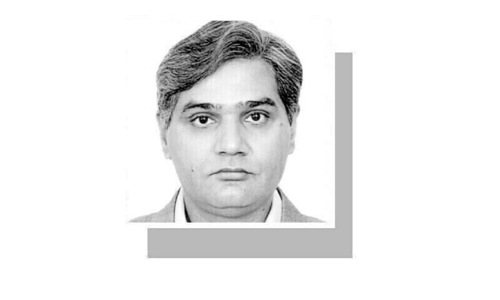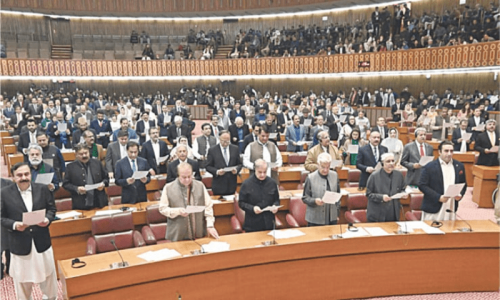ISLAMABAD: The National Assembly on Tuesday carried out a heavy legislative business, including passage of nine and introduction of six bills, as Deputy Speaker Zahid Akram Durrani continued the proceedings of the house on the first private member’s day of the present session without caring for the quorum which was clearly lacking.
The lower house of parliament also approved an amendment to the assembly rules, giving powers to the heads of the committees to determine the agenda of the meetings, instead of the ministers concerned.
The lack of interest of the members in the proceedings can be gauged from the fact that only 18 lawmakers were present in the 342-member house when the deputy speaker put the amendment seeking changes in the Rules of Procedure and Conduct of Business in the National Assembly 2007 for a vote. The amendment to Rule 239 of the assembly rules moved by Qadir Khan Mandokhel of the PPP was approved by the house with a 17-1 vote.
Since no member pointed out lack of quorum, the house managed to take up over 100 agenda items, out of 114, during the two-hour long proceedings, excluding the 40-minute Maghrib prayer break.
Committee heads get power to determine agenda for meetings; PPP MNA introduces bill seeking trial of acid attack cases under ATA
After the approval of the amendment to the assembly rules, the committee chairpersons will now be able to determine the timetable and the agenda of their committees “after intimation to the minister concerned”, instead of “in consultation with the minister”.
Moving the amendment, Mr Mandokhel recalled that in the last four years, the committee on communications was able to hold only three meetings because of the refusal of former minister Murad Saeed to attend the proceedings.
Parliamentary Affairs Minister Murtaza Javed Abbasi, while supporting the amendment, said many other committees were also facing a similar situation because of the ministers giving preference to their other engagements over the committees’ proceedings.
The bills seeking to amend Pakistan Medical and Dental Council (PMDC) and repealing the Medical Teaching Institution (MTI) Act were among those nine bills which smoothly sailed through the assembly.
The two bills had already been passed by the National Assembly but later the Senate approved them with a number of amendments, because of which the members of the lower house were again required to approve the amended bills.
The bills which were introduced by the lawmakers included the Code of Criminal Procedure (Amendment) Bill 2022; the Constitution (Amendment) Bill 2022 (Amendment in Articles 204 and 209); the Muslim Family Laws (Amendment) Bill 2022; the Anti-Terrorism (Amendment) Bill 2022 and the National Commission on the Rights of Child (Amendment) Bill 2022.
Through the bill seeking an amendment to the Anti-Terrorism Act 1997, mover Mr Mandokhel has sought trial of the accused in acid throwing cases by the anti-terrorism courts.
“Acid throwing burn crimes are increasing day by day. Hundreds of women and children have been burned as a result of this horrendous act,” says the ‘Statement of Objects and Reasons’ attached to the bill.
It further says that “because of the socio-economic situation pertaining to victims, the fear and stigma they confront, as well as highly complex nature of acid and burn injuries, a deterrent legislation is required”.
“The Anti-Terrorism Act 1997 has as its primary goal the prevention of terrorism as well as the speedy trials of heinous offences. Therefore, it is critical to include use of corrosive substance in the Anti-Terrorism Act,” it concludes.
The deputy chairman referred all the introduced bills to the committees concerned after the government did not oppose them.
The National Assembly will meet again on Wednesday (today) at 11am.
Published in Dawn, October 19th, 2022

















































